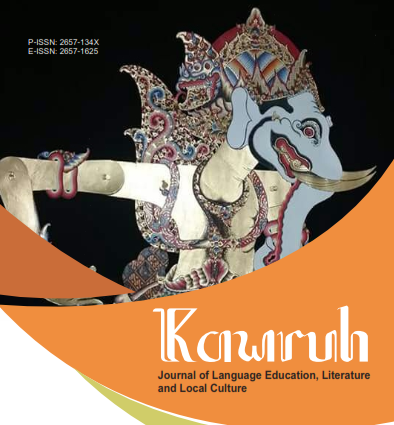Degradasi Tradisi : Pernikahan Jawa Pada Masa Pandemi Covid-19
DOI:
https://doi.org/10.32585/kawruh.v4i1.2267Kata Kunci:
Javanese wedding, tradition, degradationAbstrak
This study aims to explain the form of modification and the factors behind the degradation of traditional values in Javanese wedding ceremonies as a result of the implementation of PPKM during the Covid 19 pandemic. The data source in this study is the event of Javanese wedding traditions in Jatipuro Karanganyar. The data are in the form of behavior, actions, words, and symbols in the Javanese wedding event in Jatipuro Karanganyar. Collecting data using the listen method using the recording technique, and the advanced note-taking technique. The research uses qualitative methods with a phenomenological approach. The method of presenting the results of data analysis using informal methods. The results explain that restrictions on community activities during the pandemic have an impact on the modification of traditional wedding ceremonies. Javanese wedding traditions are sacred and noble and become a medium for the community in synergizing in the same 'feel', being friendly and helping each other to change. The change was caused by a modification to summarize the order of the wedding ceremony and a reduction in the number of participants or cultural actors involved, during the covid 19 pandemic. This has an impact on the degradation of the value of a Javanese wedding tradition. In the past, it was created by the ancestors to have hope as a symbol of the concept of prayer of hope, andum rasa (sharing happiness), guyub (crystallization of the value of harmony), tepa selira (understanding and respecting each other), tulung tinulung (helping each other), now everything is difficult to feel. People cannot be free to be part of the running of a tradition because of the prohibition on gathering and restrictions on community social activities. The results of this study are a scientific contribution and source of learning about socio-cultural changes in society and as a reference for stakeholder policies in taking strategic steps for implementing community activities during the COVID-19 pandemic.Unduhan
Referensi
Agus Efendi. (2021). “Sajen Dalam Ruwatan Murwakala Sebagai Bentuk Resistensi.” PBSD Universitas Veteran Bangun Nusantara Sukoharjo 3 (1): 27–41.
Agustina, Yuyun. (2021). “Jurnal Sastra Indonesia Makna Kultural Pada Satuan Lingual Tradisi Sesajen Pasang Tarub.” Makna Kultural Pada Satuan Lingual Tradisi Sesajen Pasang Tarub Dalam Pernikahan Jawa 10 (2): 115–20. https://doi.org/10.15294/jsi.v10i2.42645.
Albi Anggito dan Johan Setiawan. (2018). Metodologi Penelitian Kualitatif. Edited by Ella Deffi. 1st ed. Jawa Barat: CV. JEJAK. https://books.google.co.id/books?hl=en&lr=&id=59V8DwAAQBAJ&oi=fnd&pg=PP1&
dq=alat+penelitian+adalah+tubuh+peneliti+sendiri&ots=5HdzvxduJo&sig=CwYBrdQ0yq8wKAA8X7Np__gMHbc&redir_esc=y#v=onepage&q&f=false.
Ambarwati, Alda Putri Anindika, and Indah Lylis Mustika. (2018). “Pernikahan Adat Jawa Sebagai Salah Satu Kekuatan Budaya Indonesia.” Prosiding SENASBASA 3: 17–22.
Dede Rosyada. (2020). Penelitian Kualitatif Untuk Ilmu Pendidikan. Edited by murodi. 1st ed. Jjakarta: Kencana. https://books.google.co.id/books?hl=en&lr=&id=kXIREAAAQBAJ&oi=fnd&pg=PR4& dq=Pendekatan+fenomenologi+merupakan+seperangkat+pendekatan+dalam+studi+sosial+dan+filosofis+diarahkan+untuk+&ots=wfxM0ynjJi&sig=B3-pZz3QD40LGluCMnPpp_JMmRE&redir_esc=y#v=onepage&q&f.
Eri Barlian. (2016). Metodologi Penelitian Kualitatif Dan Kuantitatif. 1st ed. padang: sukabina press. https://osf.io/preprints/inarxiv/aucjd/.
Fakhri Putra Tanoto. (2017). “Orientasi Nilai Budaya,” no. 1171030045: 15. http://yessicasuvanni4.blogspot.com/2017/01/orientasi-nilai-budaya-orientasinilai.html.
Febri endra. (2017). Pengantar Metodologi Penelitian. 1st ed. Sidoarjo. https://books.google.co.id/books?hl=id&lr=&id=s5uWDwAAQBAJ&oi=fnd&pg=PA1&dq=Model+induktif+juga+membuka+peluang+menguraikan+latar+secara+penuh+dan+dapat+membuat+keputusan+tentang+kemungkinan+pengalihan+pada+latar+yang+lain,+juga+dapat+mempelajari+pengaruh.
Harsono. (2020). “Nebus Kembar Mayang : Ritual Dalam Perkawinan Nebus Kembar Mayang : Rituals in Javanese Marriage.” Kawruh: Journal OfLanguageEducation, Literature, and Local Culture 2 (April): 28–46.
Harsono dan Adi deswijaya. (2017). “SIKAP BAHASA PAMBIWARA PERNIKAHAN JAWA DALAM PEMERTAHANAN BAHASA JAWA KAWI DI KECAMATAN BENDOSARI, KABUPATEN SUKOHARJO.” Jalabahasa 13: 233–44.
Hermawan. (2021). “Tinjauan Hukum Islam Mengenai Tradisi MANTEN MUBENG GAPURO” 8: 15.
Mardalena Hanifah. (2019). “Perkawinan Beda Agama Ditinjau Dari Undang-Undang Nomor 1 Tahun 1974 Tentang Perkawinan.” SOUMATERA LAW REVIEW 2: 297. file:///C:/Users/Windows 10/Downloads/4420-17122-1-PB.pdf.
Riswanda, Hidayah Jaya, Dzulfikar Rodafi, and Moh. Muslim. (2019). “Pernikahan Adat Jawa Perspektif Hukum Islam.” Hikmatina: Jurnal Ilmiah Hukum KEluarga Islamluarga Islam 4 (1): 203–14.
Romli, Romli, and Eka Sakti Habibullah. (2018). “Telaah Resepsi Pernikahan Adat Jawa Dalam Perspektif Hukum Islam.” Al-Mashlahah: Jurnal Hukum Islam Dan Pranata Sosial 6 (02): 177. https://doi.org/10.30868/am.v6i2.306.
Unduhan
Diterbitkan
Cara Mengutip
Terbitan
Bagian
Lisensi
Authors who publish with the Kawruh: Journal of Language Education, Literature and Local Culture agree to the following terms:
- Authors retain copyright and grant the journal the right of first publication with the work simultaneously licensed under a Creative Commons Attribution License (CC BY-SA 4.0) that allows others to share the work with an acknowledgment of the work's authorship and initial publication in this journal.
- Authors are able to enter into separate, additional contractual arrangements for the non-exclusive distribution of the journal's published version of the work (e.g., post it to an institutional repository or publish it in a book), with an acknowledgment of its initial publication in this journal.
- Authors are permitted and encouraged to post their work online (e.g., in institutional repositories or on their website) prior to and during the submission process, as it can lead to productive exchanges, as well as earlier and greater citation of published work.




